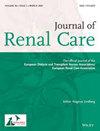Managing Kidney Disease in the Trans Community
Abstract
Background
Transgender and nonbinary people experience inequity in terms of treatment and outcomes when interacting with healthcare services. Clinicians should treat Trans people with sensitivity in a context of cultural safety to minimise repeat trauma and ensure the delivery of quality, person-centred care.
Objectives
The aim of this paper is to explore the general and specific needs of Transgender and nonbinary people when interacting with renal services and identify practice recommendations and further research needs.
Design
This paper reviews a selection of literature relating to the care of Trans people both generally within healthcare and with respect to specific issues that arise within renal care.
Renal-Specific Findings
Estimation of renal function relies on eGFR formulae that include a sex-signifier, so there are issues as to which are the appropriate versions of the formulae to use in Trans people. Research indicates that for Trans men (assigned female at birth) 6 months or more into transition-related hormonal therapy, equations used should be based on gender identity rather than sex assigned at birth. For Trans women and people who identify as nonbinary, the research is less clear and alternative means of assessing GFR may be needed.
Complications of urogenital gender-affirming surgery can also have implications for acute and chronic kidney disease progression and for the management of such patients in the clinical environment.
Conclusions
Trans people within the renal setting should be treated with sensitivity. Specific considerations are required in terms of assessing kidney function and considering the potential implications of urogenital surgery.

 求助内容:
求助内容: 应助结果提醒方式:
应助结果提醒方式:


